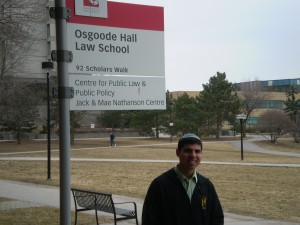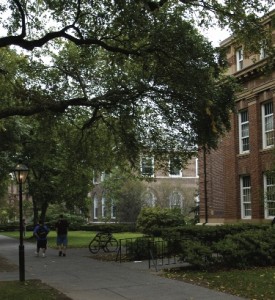Religious and Isolated on Campus: A Price Worth Paying
Though I proudly wear my kippah and am thus identifiably Jewish, I often keep my religious life to myself.
Being a religious Jew on campus is an isolating experience. Despite the ongoing learning programs, daily minyanim, kosher food and the 24/7 availability of Rabbi Aaron Greenberg, the Heshe & Harriet Seif Jewish Learning on Campus (JLIC) educator at York University in Toronto, the challenges persist. If anything, after three years as an undergraduate student at York and one semester at its affiliate law school, Osgoode Hall, the plethora of philosophical, social and practical issues I confront have become progressively more difficult.
The pressure to be like everyone else is real. Combine that with the religious apathy so prevalent on the college campus and it is not surprising that one finds a significant number of Orthodox students on campus who struggle with religious complacency. For example, for better or for worse, it is the general practice that students who have class during the afternoon miss the Minchah minyan on campus. While it is, of course, essential that we try and attend a minyan, either on campus or at a local shul, it is often impossible in the winter months when sunset is early. I always enjoy telling friends of the untold number of unique and creative places in which religious students daven—stairwells, empty classrooms, corridors and parking lots. But I often ask myself: If I can justify davening on my own in order to attend class, can I rationalize missing minyan in order to do homework? Or if I stay up late finishing a project, can I justify sleeping late the next morning and missing Shacharit? These are the types of internal battles I grapple with on a daily basis.
Even more distressingly, I have less and less time to devote to my religious studies and growth. While in my first year as an undergrad I devoted around twenty-five hours a week to school-related work, that number has doubled over the years. I used to be able to attend a variety of JLIC shiurim and meet with chevrutot on Sundays and in the evenings. Nowadays, I find if I do not allocate that time to my academic studies, I will fall significantly behind. Since I started law school, the academic pressure has increased and school requires more of my effort, time and energy. Having to work my classes around the Jewish calendar only adds to the stress. A product of the Jewish day school system, I had to contend with classes scheduled on Jewish holidays for the first time in my life when I started college. It’s a struggle to keep up with all that missed material; I continue to have to scramble to get notes from classmates and to reschedule tests. Of course, since I don’t study on Shabbat, I also have one less “work-day” than my peers, who spend their Saturdays studying.

David Elmaleh, a first-year law student at York University’s Osgoode Hall, considers the religious challenges he faces on campus to be worth the effort. Courtesy of David Elmaleh
How should Orthodox students balance their religious and academic goals? Should we, chameleon-like, conceal our identity and only show our true colors when surrounded by like-minded individuals? When asked to attend a study group on Saturday or a party on Friday night, should we politely decline and offer some half-true excuse about a “prior commitment”? Or should we embrace the opportunity to shed some light on Judaism and its traditional beliefs? These are questions that religious students on campus constantly face, and the answers are truly subjective and individualistic in nature.
I believe life is about making decisions and sticking to them. My value system is the central component of my life, and I look for ways to navigate these dilemmas by drawing upon my values.
I grew up in a Jewish “bubble,” where my classmates were not only Jewish but religious as well. Making the transition to a college campus, an atmosphere saturated with modern liberalism and one that deems religion a counterculture, was difficult.
It led me to ask myself a fundamental question: In all my years of Jewish education, why didn’t I learn how to balance these seemingly competing worlds? The first few months at York were the toughest; I had to adapt to a climate where many aspects of everyday life were a shock. The attire—or lack of it—was quite different than what I was used to. The language I heard around me was often vulgar. At times, I experienced subtle and even not-so-subtle anti-Semitism. As I was “fresh off the boat” from Yeshivat Hakotel in Israel, my greatest difficulty was figuring out how to navigate this new foreign environment. No longer could I hide away in the beit midrash and connect with my idealistic companions. Instead, I was forced to slowly develop a mindset that would allow me to interact with my classmates while at the same time retain a certain distance. It is a constant uphill struggle to find the proper balance.
If I can justify davening on my own in order to attend class, can I rationalize missing minyan in order to do homework?
And yet, there are opportunities for deepening one’s religious devotion and observance on campus. Being situated in a place where misunderstanding of Judaism is rampant and where I am constantly confronted with questions about my religion, I am forced to dig deeper into my tradition, to understand the reasons behind Jewish laws and rituals—eating kosher, davening or observing Shabbat—in a more sophisticated way.
Being Orthodox on campus has taught me to try to build bridges, not barriers; it has taught me to seek new ways in which I am similar to my colleagues. I am honored to be able to represent Judaism and to clarify stereotypes in a way that I never thought possible. I often explain to my fellow students that Judaism, unlike many other religions, does not believe that only members of its religion are entitled to go to “Heaven.” I find myself explaining some aspects of our isolationist culture and that the prohibition against intermarriage is not based on the notion that Gentiles are “unworthy,” are considered “second-class citizens” or are “inherently flawed,” but rather on our need for continuity.
But in a post-emancipation, post-9/11 world, where strict religious practice is often erroneously associated with terrorism and religious fanaticism, it is difficult to open up fully with my fellow students. Though I proudly wear my kippah and am thus identifiably Jewish, I often keep my religious life to myself. I am perfectly comfortable with my approach—though, as a result, I feel isolated. My classmates—with whom I have cried and laughed, with whom I have burned the midnight oil studying for final exams, with whom I have anxiously awaited test results, with whom I have drunk gallons of coffee and whom I see more often than my family—do not know intimate details about what shapes my life, my personality and my very essence.
This is why JLIC is so important for Orthodox college students: It helps create a sense of belonging. It provides a multitude of opportunities for students on campus to participate in a religious lifestyle. Perhaps most importantly, it gives students access to an amazing campus rabbi with whom we can learn, discuss our challenges and confide in.
Ultimately, being an identifiable Orthodox Jew on campus raises complex issues. Nevertheless, I am not envious of my fellow students who either do not observe their faith or who have no faith at all. The joy of learning, the opportunity to confront deep questions and the challenges associated with maintaining my religious practice in the face of adversity have molded me into the person I am today. It is not an easy path, but it is most definitely a rewarding one. Rabbi Joseph B. Soloveitchik is quoted as saying, “Great is not the man who has never faltered, but the man who has tripped, fell and rose again to greater heights.”1 Our heritage teaches us that hardship improves the taste of victory. And so, as an Orthodox Jew on campus, I feel more fulfilled about who I am and am more satisfied with what I overcome on a daily basis. A religious Jew in a secular environment is not a paradox, nor is it an oxymoron. It is a reality. It is my reality. And it is a reality I wholeheartedly embrace.
David Elmaleh grew up in Toronto. He received his BA in business and economics from York University in 2008, and is currently pursuing his JD at York’s Osgoode Hall Law School.
Note
1. Rabbi Ronnie Ziegler, Lecture #14: “Catharsis of the Intellect and of the Religious Experience,” in the Introduction to the Philosophy of Rav Soloveitchik series of online classes, available at http://www.vbm-torah.org/archive/rav/ rav14.htm.

